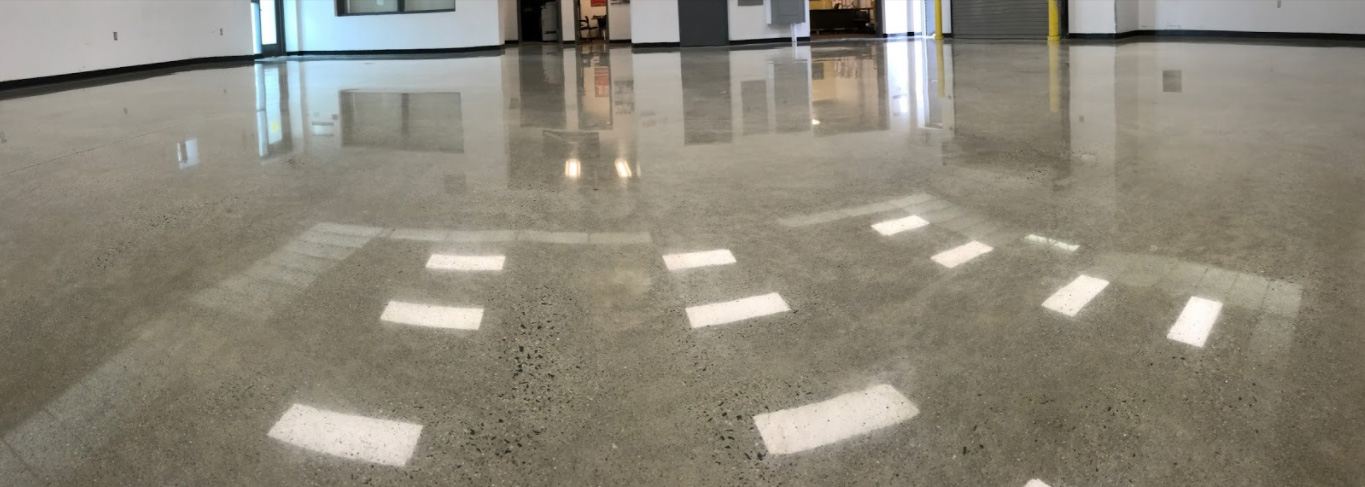
Ever wonder why some companies can offer polished concrete services at significantly lower costs than others? Could they be compromising on quality? Perhaps skipping essential steps in the process? Maybe they’re using substandard materials, or could it be that they’ve just mastered efficiency? It’s important to ask these questions before making your decision.
Let’s delve into the factors that influence the cost of polished concrete floors and explore whether any steps can be omitted or minimized in the process. Is ‘affordable’ polished concrete truly a possibility? Let’s find out.
Based on our extensive experience with polished concrete, it’s clear that the value you receive is directly proportional to the investment you make. The process of properly polishing concrete is highly laborious. It’s also important to note that the industry largely lacks regulation, and not all concrete polishing tools are of the same quality.
High-grade professional tools, chemicals, a professional concrete grinder, and machinery are essential for accomplishing a beautifully decorative concrete surface. These items can be costly, but they are absolutely necessary for the job.
Attempts to “save money” by cutting corners in any of these steps often results in omissions or errors in the process. This can ultimately compromise the quality and durability of the polished concrete.
The phrase ‘false economy’ is one we’re all familiar with. It’s crucial to ensure that your polished concrete floor serves its intended purpose once the polishing process is complete. Is it truly worth it to save a small amount of money, only to discover that your concrete flooring quickly loses its shine, or is too porous for practical use? If you find yourself needing to replace or redo the flooring in just six months, then you haven’t actually saved any money. Remember, the main appeal of polished concrete floors is their exceptional durability.
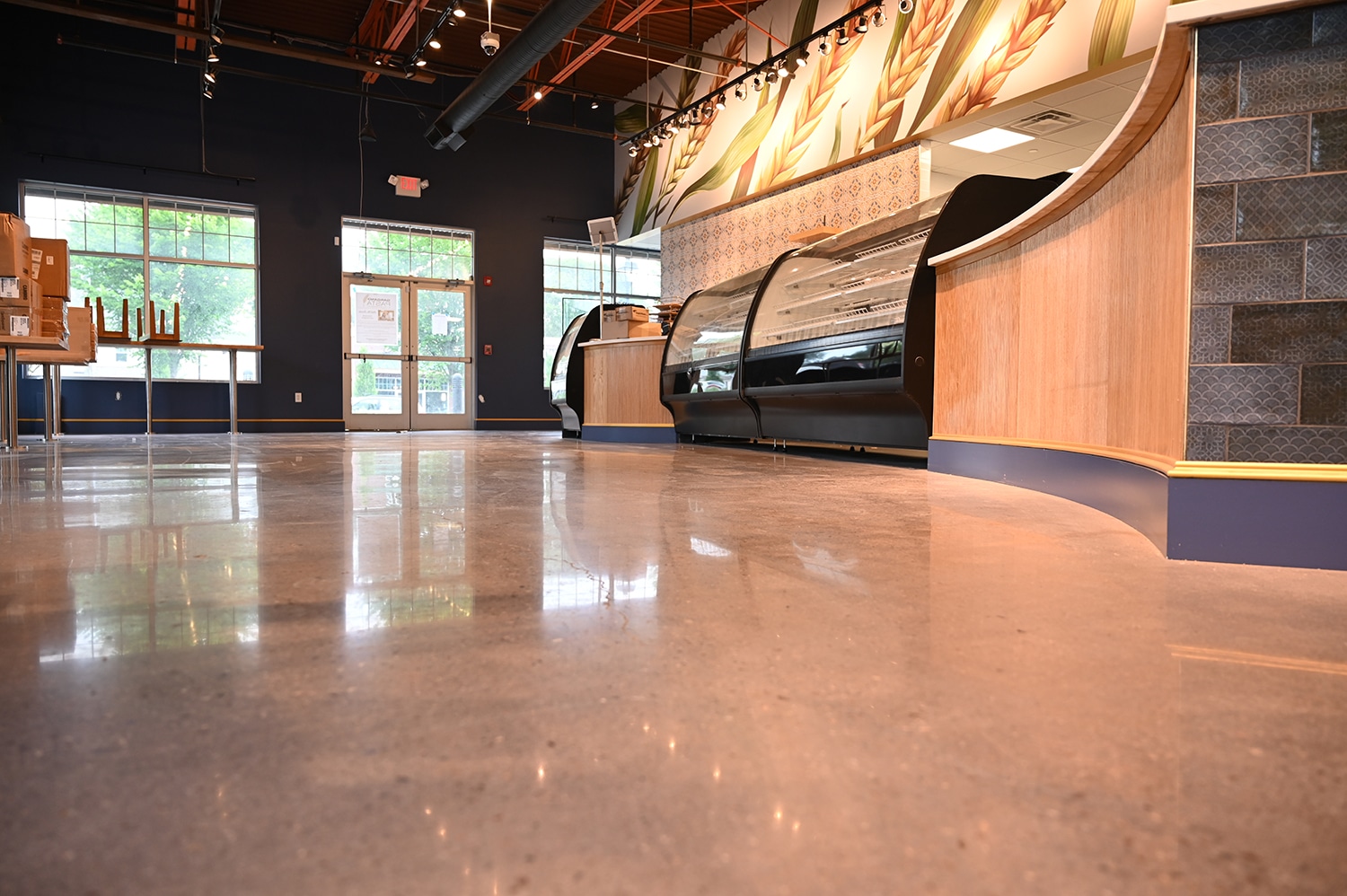
When compared to other high-end flooring options like ceramic tile, porcelain tile, or natural wood, the cost of concrete flooring isn’t exorbitant. However, it may appear costly when juxtaposed with more affordable alternatives like Vinyl Composition Tile (VCT) or bamboo flooring, but again with polished concrtete’s exceptional durability, you get what you pay for.
Now, let’s explore the process involved in creating polished concrete floors. We’ll also discuss the key questions you should pose to your concrete contractor before initiating the project, and what details should be clearly outlined in your quotation.
WHAT IS POLISHED CONCRETE?
Polished concrete is the result of a meticulous process involving mechanical refinement with diamond tooling. While not all concrete requires grinding, in most cases, the top surface of the concrete is removed using extremely abrasive diamond metal tools. The polishing itself is accomplished with resin tools.
So, how exactly is concrete flooring polished? After the surface has been ground to the desired level, the scratches made by the coarse tools need to be eliminated by the subsequent set of tools. Essentially, this process is repeated multiple times, each time using finer grits or grades of diamonds. This continues until the concrete achieves the level of shine you’re aiming for.
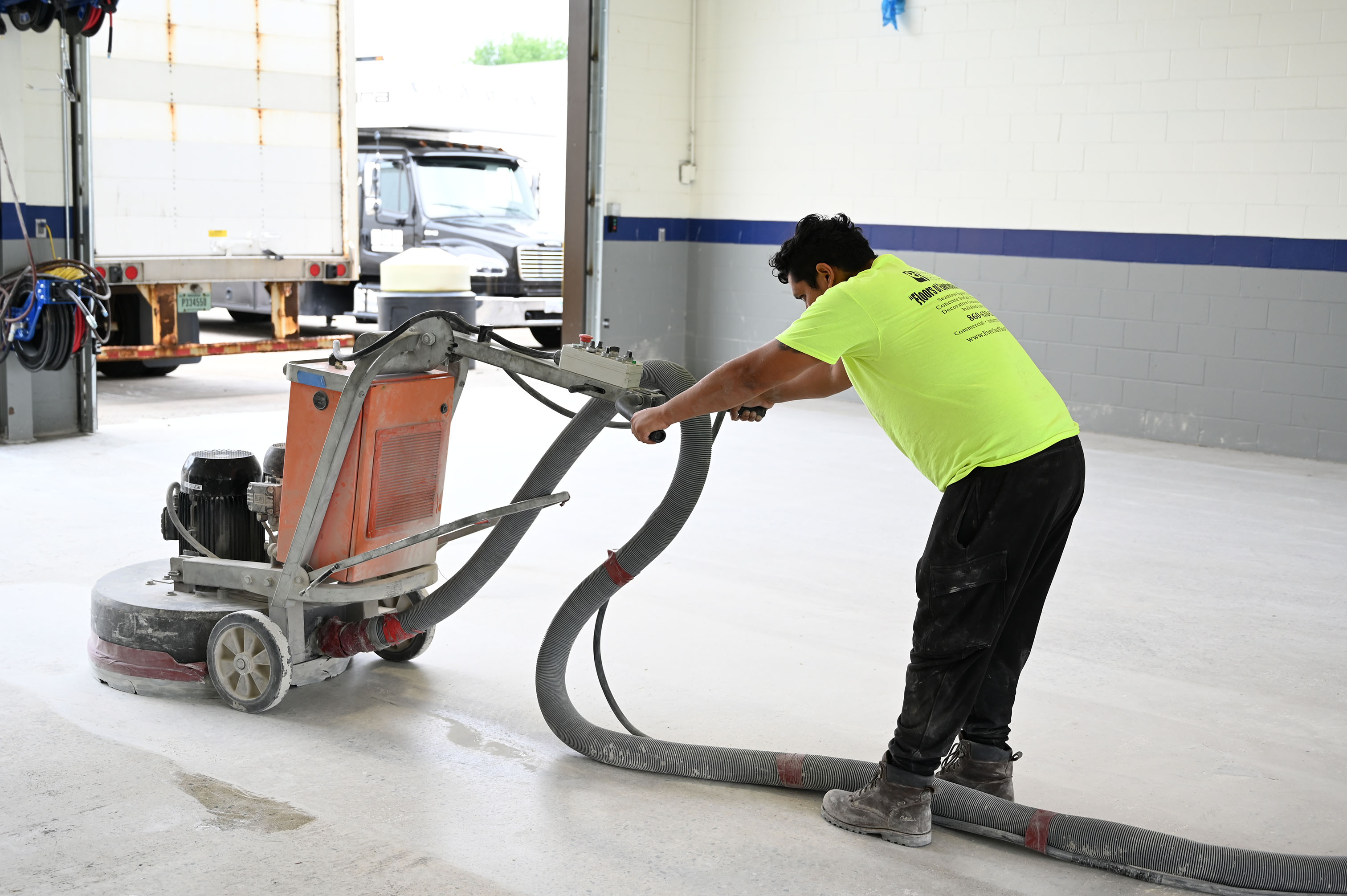
Unfortunately, we’ve seen numerous instances where it’s evident that the contractor has skipped through the grit stages to save time. This often results in unsightly scratches that trap dirt, possibly in the hopes that they will go unnoticed.
In addition to using diamond tools for grinding, honing, and polishing, the concrete slab must also be chemically treated with a concrete densifier. Once all procedures are completed, the concrete flooring should be sealed with a stain guard for protection.
The initial installation of the concrete slab is a crucial step and must be executed properly. We frequently collaborate with our clients and their selected contractor to ensure the concrete is poured and laid according to our specifications. We also provide concrete mix designs for guidance.
CHOOSING YOUR CONTRACTOR
Given the relatively unregulated nature of the concrete industry, it’s critical to ensure you select a concrete contractor who is right for your needs. You should feel confident that your chosen contractor possesses the necessary experience and expertise to execute your project successfully.
Consider examining their website for examples of past projects they’ve completed. Be cautious, however, if there are numerous photos without any accompanying descriptions of the work done or details about the project’s location. It’s crucial to verify that the images are original and not stock photos, as many images can be readily found online.
A competent concrete polisher should be committed to providing aftercare services and a diligent company will also equip you with comprehensive maintenance guidance to maximize the life of your floor. Conversely, they are likely to provide in-depth information to guarantee a proficient installation. This includes advising on the appropriate grade of concrete to utilize and how it should be laid to ensure the final result aligns with your vision for the floor.
THE IMPORTANCE OF QUALITY DIAMOND TOOLING
The key to achieving a desirable finish through diamond polishing, as implied by the name, lies in using high-quality diamond tools. After all, it’s these diamonds that grind down the floor, hone the surface, or polish the concrete.
We’ve encountered a multitude of issues with diamond tools. However, the primary issues stem from tools incorporating either a low quantity or low grade of diamonds.
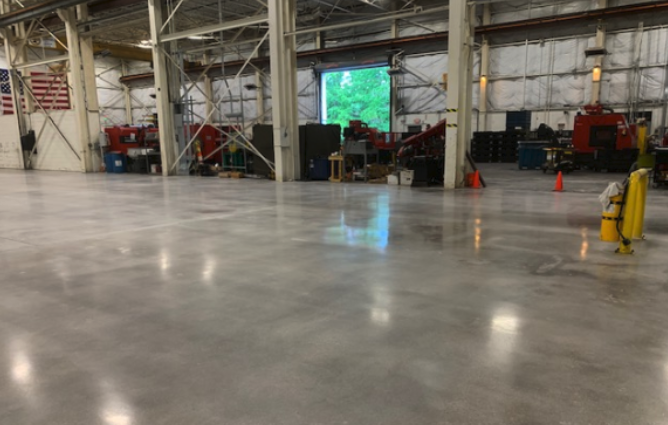
THE IMPORTANCE OF DENSIFYING AND SEALING THE FLOOR
Unfortunately, these two steps are frequently either omitted from the process or billed separately, as if they’re inconsequential. However, this is a misconception. Without these two elements, the likelihood of concrete floors staining rapidly significantly increases.
Without proper application of a high-quality silicate densifier to the concrete surface, achieving a satisfactory floor is unlikely. During concrete grinding and polishing, sand and stones may dislodge from the matrix, resulting in a dusty surface that’s challenging to clean. Densifying the concrete complements any sealant applied to the flooring, as it essentially seals the concrete from within. This increases resistance to stains and reduces porosity.
Does your competitive pricing include a sealer? Without proper sealing, concrete tends to stain easily, especially when contaminants aren’t promptly removed. Some contractors might argue that a densifier alone can effectively seal the floor. While there’s some truth to this, it’s crucial to remember that a densifier works through a chemical reaction with the concrete, which can take between 6-12 months to complete. Are you prepared to keep your floor completely clean and avoid accidental spills during this waiting period?
Extra stain protection is always necessary to provide you with enough time to clean up spills and remove dirt contamination. Applying, curing, and drying sealants require time. While high-quality sealants may be costly, they are absolutely essential. Remember, staining should never be just an option!
One last thing to keep in mind. Epoxy coatings and other similar plastic-like floor coatings are not used when the flooring has undergone mechanical diamond polishing. If such coatings are applied, it’s usually to disguise the fact that diamond polishing hasn’t actually been done! These types of coatings do not harmonize with the natural essence of concrete and seriously undermine the aesthetic appeal of what is fundamentally a very organic flooring medium.
WHAT SHOULD BE ON YOUR QUOTATION?
We believe it’s crucial to provide a detailed quotation that thoroughly outlines the scope of work to be performed. Does the project involve grinding off the concrete surface? Are flooring materials like densifier and sealer included in the cost? These are important details that should be clearly stated.
Including the desired gloss level in the list of works on your quote is always a wise decision. Just as the extent of grinding impacts the quote, so does the amount of polishing. Achieving a high-gloss finish requires many more passes with the polishing pads compared to a matte finish, so specifying this in a quote can give you added assurance.
It’s always beneficial to have a clear understanding of how much surface is to be ground off in your quote, desired gloss level, total square footage and any tax included.
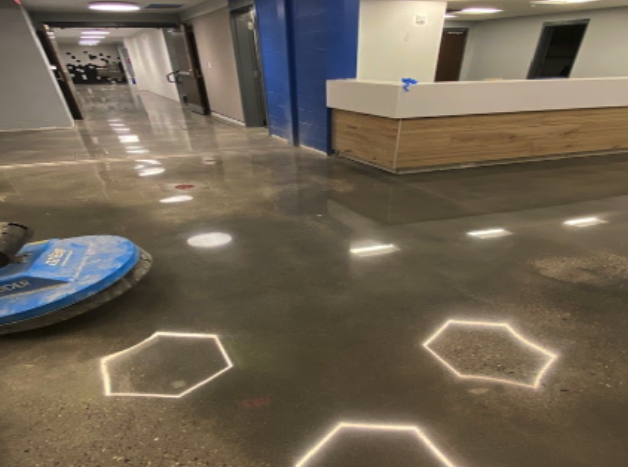
In conclusion, it’s essential not to be swayed by the allure of cheap polished concrete. The adage “you get what you pay for” rings particularly true in this context. Lower-cost options may seem tempting, but they often come with a compromise on quality, durability, and long-term performance. Investing in a high-quality polished concrete finish ensures you receive a product that not only looks superior but also stands the test of time, providing excellent value for your money. Therefore, when considering polished concrete, prioritize quality over cost for a truly worthwhile investment.
